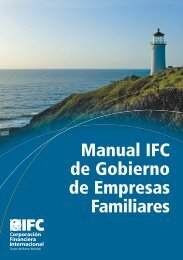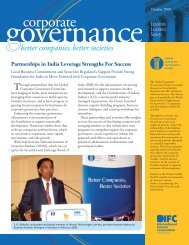Corporate Governance for Banks in Southeast Europe: Policy - IFC
Corporate Governance for Banks in Southeast Europe: Policy - IFC
Corporate Governance for Banks in Southeast Europe: Policy - IFC
Create successful ePaper yourself
Turn your PDF publications into a flip-book with our unique Google optimized e-Paper software.
Background Box 1: Legal Requirements <strong>for</strong> Independence <strong>in</strong> SEE <strong>Banks</strong>AlbaniaIn Albania, Article 35(4) of the Law on <strong>Banks</strong> requires that “At least one-third of the members of the Steer<strong>in</strong>gCouncil shall be composed of <strong>in</strong>dividuals that . . . are not connected through private <strong>in</strong>terests . . . with thebank, shareholders that control the bank or its executive directors.” There is no requirement that these“<strong>in</strong>dependent” members sit on board committees, members of which can be outsiders (not board members).Bosnia and Herzegov<strong>in</strong>aIn both entities of Bosnia and Herzegov<strong>in</strong>a, the Law on <strong>Banks</strong> requires members of the “audit board” to be<strong>in</strong>dependent from the executives of the bank. 25 Audit boards are special structures that have a different legalstatus from audit committees of the board as typically understood under best practice. 26 Members of theaudit boards can be outsiders (not board members).BulgariaIn Bulgaria, there is no requirement <strong>for</strong> the appo<strong>in</strong>tment of <strong>in</strong>dependent directors of banks that are notpublicly listed. The three largest banks are subsidiaries of EU banks that are publicly listed and whosegovernance policies are determ<strong>in</strong>ed by group practice. In general, the presence of <strong>in</strong>dependent, nonexecutiveboard members is the exception rather than the rule.CroatiaIn Croatia, few banks have <strong>in</strong>dependent board members. The requirement to have at least one <strong>in</strong>dependentboard member on the supervisory board entered <strong>in</strong>to <strong>for</strong>ce on January 1, 2010, and it is expected thatcompliance will improve <strong>in</strong> the future.FYR MacedoniaIn FYR Macedonia, Article 88(2) of the Bank<strong>in</strong>g Law requires that one-fourth of the board be <strong>in</strong>dependent(outsiders). 27 The same law requires the majority of the members <strong>in</strong> the audit<strong>in</strong>g committee to be electedfrom the members of the supervisory board, and “the other members shall be <strong>in</strong>dependent members.” Theaudit<strong>in</strong>g committee is there<strong>for</strong>e made up of a m<strong>in</strong>ority of members who do not sit on the supervisory board.MontenegroIn Montenegro, Article 30 of the Law on <strong>Banks</strong>, requires that at least two board members be <strong>in</strong>dependentfrom the bank. “Independent from the bank” means a person that 1) has no qualified stake <strong>in</strong> the bank orthe parent company of the bank<strong>in</strong>g group to which the bank belongs; and 2) <strong>in</strong> the previous three years hasnot been employed <strong>in</strong> the bank or its subsidiary company. Article 39 of the same Law, requires the auditcommittee to be made up of at least three members, the majority of whom are not connected to the bankand have experience <strong>in</strong> f<strong>in</strong>ance.25 Article 76 of the Law on <strong>Banks</strong> of Republika Srpska and Article 32h of the Law on <strong>Banks</strong> of the Federation of Bosnia and Herzegov<strong>in</strong>a provide that the“Chairman and members of Audit Board may not be appo<strong>in</strong>ted from the group that <strong>in</strong>cludes the Chairman or members of Supervisory Board andmust not be members of Management or staff with<strong>in</strong> the bank, nor may he/she have direct or <strong>in</strong>direct f<strong>in</strong>ancial <strong>in</strong>terest <strong>in</strong> the bank, except <strong>for</strong> thecompensation based upon conduct of that function.”26 Ibid.27 Accord<strong>in</strong>g to Article 2(27) of the Bank<strong>in</strong>g Law, “Independent member” is “a natural person and natural persons connected thereto, who: is notemployed or a person without special rights and responsibilities <strong>in</strong> the bank (i.e., a member of the Supervisory Board, member of the Board ofDirectors, member of the Audit<strong>in</strong>g Committee, member of the Risk Management Committee and other managers as def<strong>in</strong>ed by the Statute of thebank. In the case of a <strong>for</strong>eign bank branch: is a natural person manag<strong>in</strong>g the branch; is not a shareholder with a qualified hold<strong>in</strong>g <strong>in</strong> the bank or doesnot represent a shareholder with a qualified hold<strong>in</strong>g <strong>in</strong> the bank; does not work, or has not been work<strong>in</strong>g <strong>in</strong> an audit company over the last threeyears, which at that time audited the operations of the bank; and has no f<strong>in</strong>ancial <strong>in</strong>terest or bus<strong>in</strong>ess relation with the bank <strong>in</strong> an amount exceed<strong>in</strong>gDenar 3,000,000 annually, on average, over the last three years.”<strong>Corporate</strong> <strong>Governance</strong> <strong>for</strong> <strong>Banks</strong> <strong>in</strong> <strong>Southeast</strong> <strong>Europe</strong> <strong>Policy</strong> Brief 19



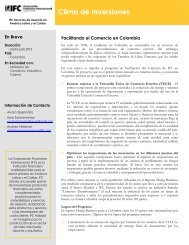
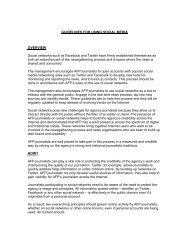
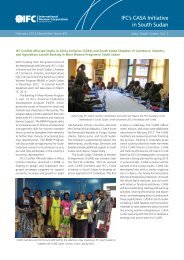
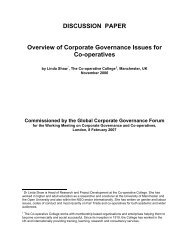
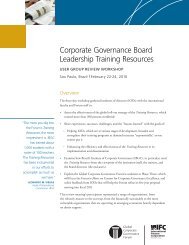

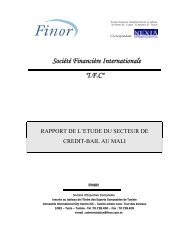
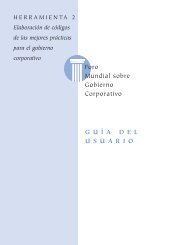

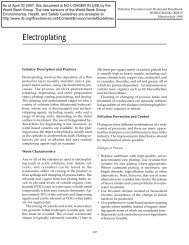
![Print a two-page fact sheet on this project [PDF] - IFC](https://img.yumpu.com/43449799/1/190x245/print-a-two-page-fact-sheet-on-this-project-pdf-ifc.jpg?quality=85)
